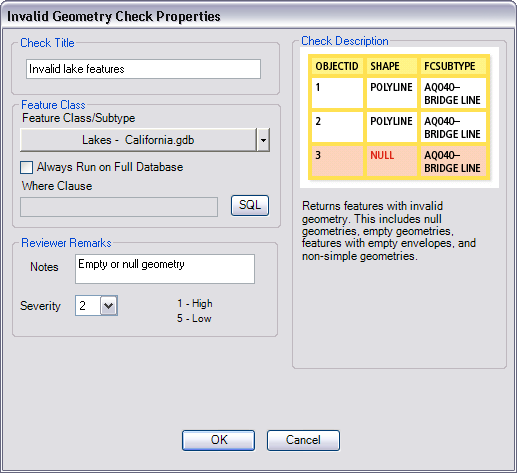Available with Data Reviewer license.
Invalid geometry is caused by a variety of processes, including loading and clipping data. Geometry that is considered invalid meets one of the following conditions:
- Empty—This condition occurs when the geometry of a feature has zero points and does not contain geometric information, represented by SHAPE_LEN and SHAPE_AREA fields, beyond its original initialization state. Empty geometries can be introduced when data is created or edited programmatically and when bad data is imported into your geographic information system.
- Nothing—This condition occurs when a feature has a NULL value in the SHAPE field. This type of error is returned when the check is unable to retrieve geometry information for a feature.
- Not simple—This condition occurs when any of the following conditions are true:
- Ring orientation is incorrect (applicable only to polygon features)—A polygon that does not self-intersect, but its rings are not oriented correctly (outer rings—clockwise; inner rings—counterclockwise).
- Segment orientation is incorrect—Individual segments are not consistently oriented. The to point of segment i should be coincident on the from point of segment i+1.
- Contains short segments—Some segments are shorter than allowed by the system units of the spatial reference associated with the geometry.
- Contains self-intersecting rings (applicable only to polygon features)—A polygon must not intersect itself.
- Contains self-intersecting paths (applicable only to polyline features)—A polyline must not intersect itself.
- Contains unclosed rings (applicable only to polygon features)—The last vertex in a ring must be coincident with the first vertex in the ring.
- Contains mismatched attributes—The z- or m-coordinate of a line segment's endpoint does not match the z- or m-coordinate of the coincident endpoint on the next segment.
- Contains discontinuous parts—One of the geometry's parts is composed of disconnected or discontinuous parts.
- Empty z-values (applicable to z-enabled features)—The geometry has one or more vertices with an empty z-value (NaN for example).
- Has an empty envelope—This condition occurs when a feature's envelope, or bounding rectangle, does not have any geometric information. This condition is similar to the empty geometry scenario.
The Invalid Geometry Check finds invalid features in a selected feature class and returns them as check results. The check can be run on an entire feature class, a subtype, or a set of features selected using a SQL query.
Once you have defined the criteria for the check, you can configure the notes and a severity rating. The notes allow you to provide a more specific description for the feature that has been written to the Reviewer table and are copied to the Notes field in the Reviewer table. The severity rating allows you to indicate how important the results from a check are in terms of your quality assurance/quality control processes. The lower the number, the greater the priority the check's results have.
- Start ArcMap.
- On the main menu, click Customize > Toolbars > Data Reviewer.
- Click the Select Data Check drop-down arrow on the Data Reviewer toolbar, click the plus sign (+) next to Default Checks, then click Invalid Geometry Check.
The Invalid Geometry Check Properties dialog box appears.

- If necessary, type a unique name for the check in the Check Title text box.
- Click the Feature Class/Subtype drop-down arrow to choose the feature class and subtype on which to run the check.
- To run the check on the entire feature class and save this setting, check the Always Run on Full Database check box.
- To run the check on specific features in a feature class, click SQL to construct an SQL query.
- If necessary, type descriptive text for the check results in the Notes text box in the Reviewer Remarks area.
- If necessary, click the Severity drop-down arrow and choose a value that indicates the priority of the check's results in the Reviewer Remarks area.
The severity indicates the importance of the check result. The values range from 1 to 5, with 1 being the highest priority and 5 being the lowest.
- Click OK.
- Click the Run Data Check button
 on the Data Reviewer toolbar.
on the Data Reviewer toolbar.
The Features to Validate dialog box appears.

- To run the check only on features that have been edited in a versioned workspace, check the Changed Features Only check box.
- Click OK.
The check is run on the extent specified on the Features to Validate dialog box.
When the check finishes, a check results dialog box appears.
- Do one of the following:
- If you want to browse the results in the Browse Features window, choose the Browse Results option.
- If you have started a Reviewer session and want to record the results in the Reviewer table, choose the Write to Reviewer Table option.
- Click OK.